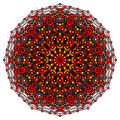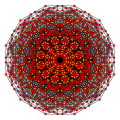In six-dimensional geometry, a cantellated 6-orthoplex is a convex uniform 6-polytope, being a cantellation of the regular 6-orthoplex.
 6-orthoplex |
 Cantellated 6-orthoplex |
 Bicantellated 6-orthoplex | |||||||||
 6-cube |
 Cantellated 6-cube |
 Bicantellated 6-cube | |||||||||
 Cantitruncated 6-orthoplex |
 Bicantitruncated 6-orthoplex |
 Bicantitruncated 6-cube |
 Cantitruncated 6-cube | ||||||||
| Orthogonal projections in B6 Coxeter plane | |||||||||||
|---|---|---|---|---|---|---|---|---|---|---|---|
There are 8 cantellation for the 6-orthoplex including truncations. Half of them are more easily constructed from the dual 5-cube
Cantellated 6-orthoplex
| Cantellated 6-orthoplex | |
|---|---|
| Type | uniform 6-polytope |
| Schläfli symbol | t0,2{3,3,3,3,4} rr{3,3,3,3,4} |
| Coxeter-Dynkin diagrams |
|
| 5-faces | 136 |
| 4-faces | 1656 |
| Cells | 5040 |
| Faces | 6400 |
| Edges | 3360 |
| Vertices | 480 |
| Vertex figure | |
| Coxeter groups | B6, [3,3,3,3,4] D6, [33,1,1] |
| Properties | convex |
Alternate names
- Cantellated hexacross
- Small rhombated hexacontatetrapeton (acronym: srog) (Jonathan Bowers)[1]
Construction
There are two Coxeter groups associated with the cantellated 6-orthoplex, one with the B6 or [4,3,3,3,3] Coxeter group, and a lower symmetry with the D6 or [33,1,1] Coxeter group.
Coordinates
Cartesian coordinates for the 480 vertices of a cantellated 6-orthoplex, centered at the origin, are all the sign and coordinate permutations of
- (2,1,1,0,0,0)
Images
| Coxeter plane | B6 | B5 | B4 |
|---|---|---|---|
| Graph |  |
 |
 |
| Dihedral symmetry | [12] | [10] | [8] |
| Coxeter plane | B3 | B2 | |
| Graph |  |
 | |
| Dihedral symmetry | [6] | [4] | |
| Coxeter plane | A5 | A3 | |
| Graph |  |
 | |
| Dihedral symmetry | [6] | [4] |
Bicantellated 6-orthoplex
| Bicantellated 6-orthoplex | |
|---|---|
| Type | uniform 6-polytope |
| Schläfli symbol | t1,3{3,3,3,3,4} 2rr{3,3,3,3,4} |
| Coxeter-Dynkin diagrams |
|
| 5-faces | |
| 4-faces | |
| Cells | |
| Faces | |
| Edges | 8640 |
| Vertices | 1440 |
| Vertex figure | |
| Coxeter groups | B6, [3,3,3,3,4] D6, [33,1,1] |
| Properties | convex |
Alternate names
- Bicantellated hexacross, bicantellated hexacontatetrapeton
- Small birhombated hexacontatetrapeton (acronym: siborg) (Jonathan Bowers)[2]
Construction
There are two Coxeter groups associated with the bicantellated 6-orthoplex, one with the B6 or [4,3,3,3,3] Coxeter group, and a lower symmetry with the D6 or [33,1,1] Coxeter group.
Coordinates
Cartesian coordinates for the 1440 vertices of a bicantellated 6-orthoplex, centered at the origin, are all the sign and coordinate permutations of
- (2,2,1,1,0,0)
Images
| Coxeter plane | B6 | B5 | B4 |
|---|---|---|---|
| Graph |  |
 |
 |
| Dihedral symmetry | [12] | [10] | [8] |
| Coxeter plane | B3 | B2 | |
| Graph |  |
 | |
| Dihedral symmetry | [6] | [4] | |
| Coxeter plane | A5 | A3 | |
| Graph |  |
 | |
| Dihedral symmetry | [6] | [4] |
Cantitruncated 6-orthoplex
| Cantitruncated 6-orthoplex | |
|---|---|
| Type | uniform 6-polytope |
| Schläfli symbol | t0,1,2{3,3,3,3,4} tr{3,3,3,3,4} |
| Coxeter-Dynkin diagrams |
|
| 5-faces | |
| 4-faces | |
| Cells | |
| Faces | |
| Edges | 3840 |
| Vertices | 960 |
| Vertex figure | |
| Coxeter groups | B6, [3,3,3,3,4] D6, [33,1,1] |
| Properties | convex |
Alternate names
- Cantitruncated hexacross, cantitruncated hexacontatetrapeton
- Great rhombihexacontatetrapeton (acronym: grog) (Jonathan Bowers)[3]
Construction
There are two Coxeter groups associated with the cantitruncated 6-orthoplex, one with the B6 or [4,3,3,3,3] Coxeter group, and a lower symmetry with the D6 or [33,1,1] Coxeter group.
Coordinates
Cartesian coordinates for the 960 vertices of a cantitruncated 6-orthoplex, centered at the origin, are all the sign and coordinate permutations of
- (3,2,1,0,0,0)
Images
| Coxeter plane | B6 | B5 | B4 |
|---|---|---|---|
| Graph |  |
 |
 |
| Dihedral symmetry | [12] | [10] | [8] |
| Coxeter plane | B3 | B2 | |
| Graph |  |
 | |
| Dihedral symmetry | [6] | [4] | |
| Coxeter plane | A5 | A3 | |
| Graph |  |
 | |
| Dihedral symmetry | [6] | [4] |
Bicantitruncated 6-orthoplex
| Bicantitruncated 6-orthoplex | |
|---|---|
| Type | uniform 6-polytope |
| Schläfli symbol | t1,2,3{3,3,3,3,4} 2tr{3,3,3,3,4} |
| Coxeter-Dynkin diagrams |
|
| 5-faces | |
| 4-faces | |
| Cells | |
| Faces | |
| Edges | 10080 |
| Vertices | 2880 |
| Vertex figure | |
| Coxeter groups | B6, [3,3,3,3,4] D6, [33,1,1] |
| Properties | convex |
Alternate names
- Bicantitruncated hexacross, bicantitruncated hexacontatetrapeton
- Great birhombihexacontatetrapeton (acronym: gaborg) (Jonathan Bowers)[4]
Construction
There are two Coxeter groups associated with the bicantitruncated 6-orthoplex, one with the B6 or [4,3,3,3,3] Coxeter group, and a lower symmetry with the D6 or [33,1,1] Coxeter group.
Coordinates
Cartesian coordinates for the 2880 vertices of a bicantitruncated 6-orthoplex, centered at the origin, are all the sign and coordinate permutations of
- (3,3,2,1,0,0)
Images
| Coxeter plane | B6 | B5 | B4 |
|---|---|---|---|
| Graph |  |
 |
 |
| Dihedral symmetry | [12] | [10] | [8] |
| Coxeter plane | B3 | B2 | |
| Graph |  |
 | |
| Dihedral symmetry | [6] | [4] | |
| Coxeter plane | A5 | A3 | |
| Graph |  |
 | |
| Dihedral symmetry | [6] | [4] |
Related polytopes
These polytopes are part of a set of 63 uniform 6-polytopes generated from the B6 Coxeter plane, including the regular 6-cube or 6-orthoplex.
Notes
References
External links
Wikiwand in your browser!
Seamless Wikipedia browsing. On steroids.
Every time you click a link to Wikipedia, Wiktionary or Wikiquote in your browser's search results, it will show the modern Wikiwand interface.
Wikiwand extension is a five stars, simple, with minimum permission required to keep your browsing private, safe and transparent.































































